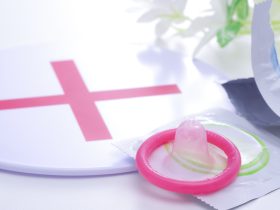The term douche comes from the French verb doucher, which can mean either “to wash” or “to soak.” It refers to the act of cleaning or rinsing out the vagina with water or another liquid. According to Fatima Daoud Yilmaz, MD, an ob-gyn at Stony Brook Medicine in New York, douching itself was practiced a long time before that.
Vaginal douches were first commercially made in the 1800s, but douching itself was practiced a long time before that.
A douche solution is typically a mixture of water and vinegar, baking soda, or iodine that may be bought in the feminine care department of most pharmacies and supermarket stores.
The procedure of douching involves introducing the solution into the vagina via a tube or nozzle. After the solution has been introduced, the water mixture is allowed to exit the body through the vagina.
Douching exposes the vagina to germs, viruses, and yeast
Daoud Yilmaz argues that the practice of douching is not only harmful but counterproductive.
According to Michigan Women’s Health, the vagina is a self-cleaning organ. The cervix and vaginal walls produce a thin layer of mucus to aid in the expulsion of menstrual blood, dead cells, and other debris. According to Daoud Yilmaz, “these cell layers are constantly sloughing away,” taking the germs and viruses with them.
According to Michigan Women’s Health, many douching products increase the vaginal pH to dangerously low levels. According to Daoud Yilmaz, this can increase the vagina’s susceptibility to pathogenic bacteria, viruses, and yeast.
Douching can disrupt antibodies that produce antimicrobial proteins on the surface of the cells that line a healthy vagina. According to Daoud Yilmaz, a weakened vaginal mucosal barrier increases susceptibility to bacterial vaginosis, yeast, and other STDs.
Pelvic inflammatory disease and UTIs cause douching
According to Daoud Yilmaz, douching can actually move infections (such as harmful germs and viruses) higher toward the cervix, uterus, and fallopian tubes. As a result, “this can lead to a condition called pelvic inflammatory disease (PID),” she explains.
According to Daoud Yilmaz, scarring in the fallopian tubes brought on by PID might induce infertility or ectopic pregnancies. According to the Mayo Clinic, PID can lead to an abscess forming in the reproductive system, which can lead to a potentially fatal infection if left untreated.
Douching may also raise the likelihood of getting a UTI. Even though fecal bacteria rather than vaginal germs typically cause UTIs, douching can irritate the urethra’s lining and result in infection, according to Daoud Yilmaz.
Misconceptions exposed about douching
1. Douching is a clean method of cleansing for women. No, again, Daoud Yilmaz thinks the vagina self-cleans. Douching removes menstrual blood and other waste but affects vaginal pH, making it susceptible to infection.
2. Deodorizing a vagina requires douche. All vaginas discharge and smell slightly different during the month. That’s natural, argues Daoud Yilmaz.
3. Pregnancy and STD prevention are two of the many benefits of douching. The removal of sperm by douching after sexual activity is a myth.
4. Douching treats bacterial infections. Douching can spread vaginal infections into the pelvis. Douching disturbs the vaginal environment, making it harder for your doctor to diagnose and treat your illness.
Vaginal hygiene routines
Daoud Yilmaz advises that women should never clean their genitalia on their own. She advises women to consult a doctor if they notice anything out of the ordinary, such as an unpleasant odor, a change in discharge, pain, abnormal bleeding, or itching.
If you want to wash the outside of your lady parts, or vulva, she suggests using lukewarm water. She explains that you may require anything other than water at certain times, including menstruation, exercise, and sexual activity. Daoud Yilmaz advises that in such instances, it is safe to use a mild, undyed plain soap without any fragrance externally as needed, although this may still be too harsh for people with sensitive skin.
















Find Us on Socials